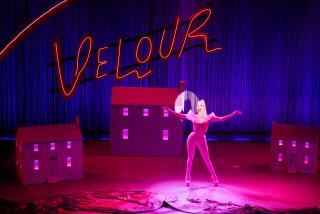Grooving to the beat of N’Dour
- Share via
There’s always a full house for Youssou N’Dour’s performances, and Saturday night was no exception at UCLA’s Royce Hall. The Senegalese singer-composer, a global superstar, was greeted by a capacity crowd and a huge surge of applause as he strolled onstage to the irresistible rhythms of his 10-piece Super Etoile de Dakar ensemble.
Or, at least, seemingly irresistible. N’Dour must have been startled when the crowd -- despite the whoops and shouts of enthusiasm -- initially seemed physically unresponsive to the visceral blandishments of his mbalax style. After two or three numbers, he took matters into his own hands, saying: “Don’t you want to dance? Come, you can dance.”
That’s all that was needed to release the genie from the bottle. In a flash, the area in front of the stage was filled with animated Terpsichores, arms and legs moving wildly in all directions, the hall’s usual restrictions against filling the aisles shoved aside by the sheer ebullience of the moment. That was pretty much the last time most of the crowd remained seated.
The sheer vitality of N’Dour’s music almost demands physical movement, and if it wasn’t possible to participate in the vibrant choreographic displays taking place in front of the stage, there was plenty of room for in-place grooving.
N’Dour responded to this rush of ardor by dialing up the already dynamic intensity of the music. A chattering, talking-drum solo by Assane Thiam was the first trigger, followed by a kinetic exhibition from a pair of N’Dour’s own athletic dancers, offering an authentic template for the eager aficionados in front of the stage. Stirring guitar solos from the cool but powerful Mamadou Mbaye and a torrent of propulsive rhythm from the four-man percussion team sustained -- and increased -- the exhilaration of the performance.
N’Dour played selections from across his varied career, and the music illuminated the essence of his belief -- underscored in the title of his recently released CD, “Rokku Mi Rokka (Give and Take)” -- in the back-and-forth between contemporary African music and the Western Hemisphere sounds and rhythms created by African slaves. The mixture was constantly compelling -- traces of reggae, calypso, blues and Cuban rhythms, blending seamlessly with N’Dour’s soaring melodies, call-and-response vocalizing and surging traditional rhythms.
Ultimately, the majority of the audience -- aside from those who had listened closely to his recordings -- probably had little comprehension of the literal subtleties of N’Dour’s lyrics. But the sheer quality of his voice, capable of delivering an astonishing range of sounds and timbres, combined with Super Etoile’s blend of ensemble craft and spontaneous energy, was more than enough to thrust aside any barriers of language and culture.
And that capacity to reach out to listeners in the most primal fashion, to engage them -- as he did with an impassioned call to deal with the spread of HIV-AIDS -- in his own universe of feeling and concern, is what makes N’Dour and his music true representatives, not just of Africa or the globe but of humanity itself.
More to Read
Sign up for The Envelope
Get exclusive awards season news, in-depth interviews and columnist Glenn Whipp’s must-read analysis straight to your inbox.
You may occasionally receive promotional content from the Los Angeles Times.







